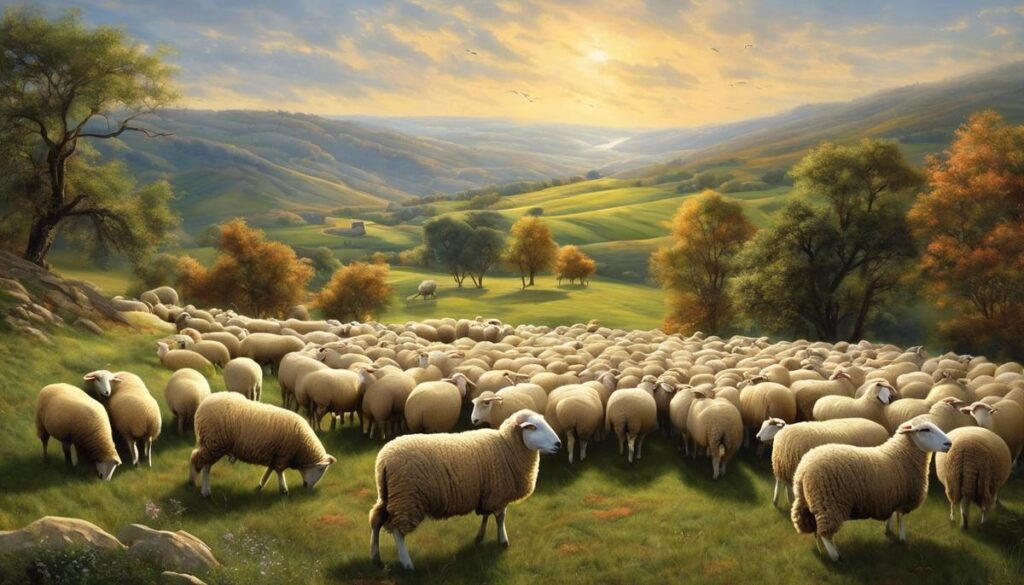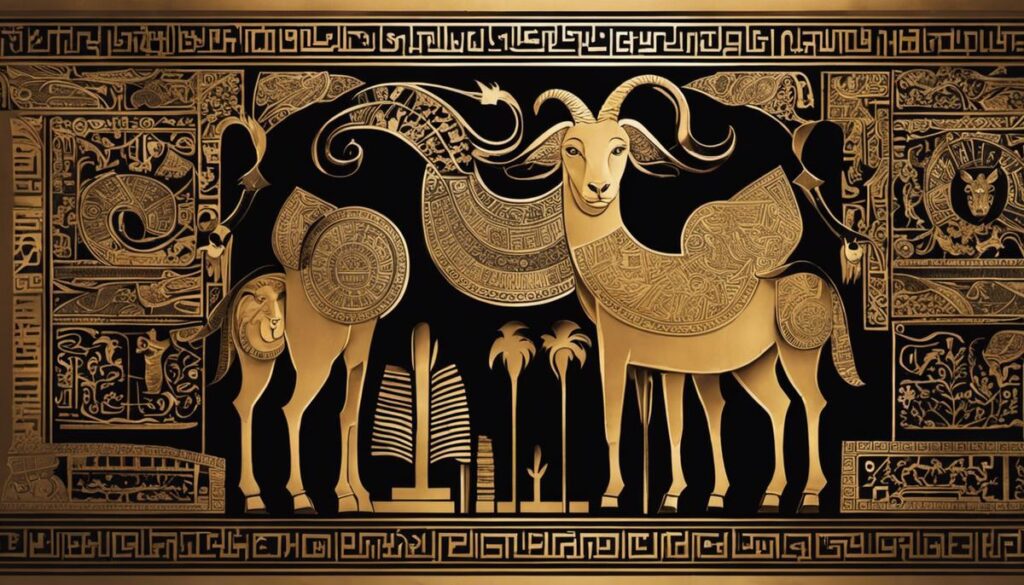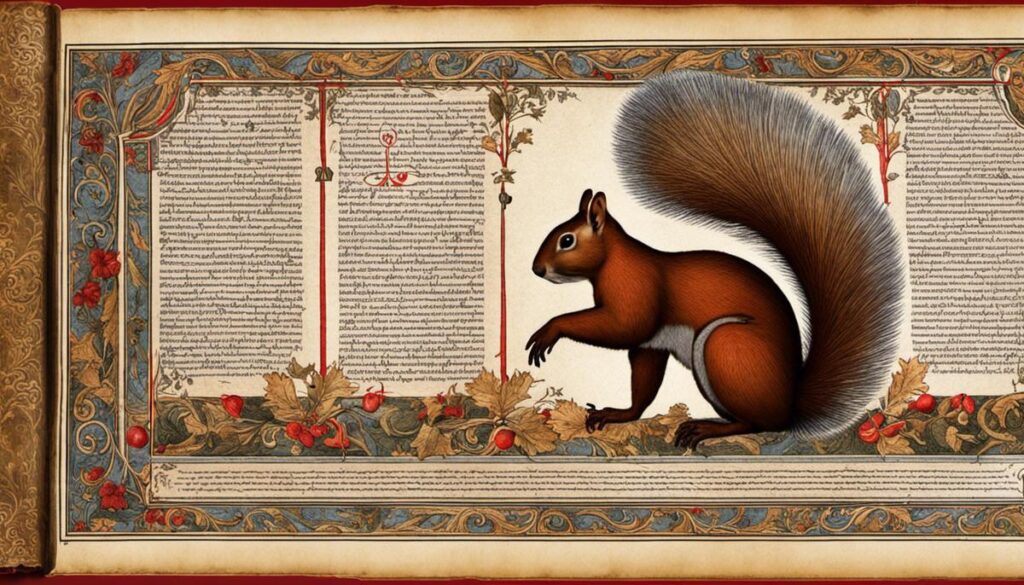In the realm of dreams and their interpretations, various symbols carry impactful connotations that have their roots embedded deep within history, religion, and psychology. One of the recurring images is that of a sheep, a symbol that bears profound biblical and psychological significance, shaping our understanding of its presence in dreams. The study of sheep as a biblical motif reveals them as emblems of innocence, obedience, sacrifice, and divine guidance. Dive deep into an analysis that takes the biblical implications of sheep and applies it to the field of dream interpretation, mingling psychological theories and cultural influences to form a comprehensive understanding.
Biblical Symbolism of Sheep
A Preeminent Look: The Symbolic Essence of Sheep in the Biblically Historical Context
An extensive exploration of historical and biblical texts reveals a profound relationship between humans and sheep, particularly in religious contexts. It becomes evident that the symbolic representation of sheep embraces a variety of aspects, with the majority gravitating towards innocence, purity, humility, sacrifice, and guardianship.
Indeed, their biblical depiction goes beyond mere livestock trade. Sheep are frequently interwoven within texts as symbolic figures, manifesting diverse messages and teachings. A quintessential example is found in the Book of Genesis where Abel offers a lamb, thereby becoming the first shepherd—a narrative intended not only as a testament of Abel’s righteousness, but symbolically demonstating obedience, sacrifice, and divine acceptance.
In the Old Testament, notably within Isaiah 40:11, a divine figure is represented as a shepherd “feeding His flock, gathered the lambs in His arms, and carrying them in His bosom.” Here, an interplay of empathy, guidance, protection, and spiritual nurturing surfaces, highlighting the confluence of sheep with divine favor.
Moreover, the juxtaposition of sheep and goats in the Book of Matthew (25:32-33), illustrates a symbolic dichotomy of righteousness, obedience, and purity (sheep) against stubbornness, independence, and disobedience (goats). This stimulates a moral discourse on character and spiritual standing, wherein sheep, with their accompanying shepherd, signify a path towards spirituality and divine guidance.
Intriguingly, in a direct departure from the ordinary, the New Testament presents sheep in another symbolic essence: that of the lamb—Jesus Christ—who is viewed as the ultimate sacrifice for humanity’s sins. Without doubt, the lamb, regarded as a young and innocent sheep, suggests a divine sacrifice of great magnitude, enduring suffering for the salvation of humankind. It emphasizes the virtue of humility, tolerance, and sacrifice, ratifying the strong symbolic association woven with the image of the lamb.
Meanwhile, Jesus’ depiction as the Good Shepherd (John 10:11), reestablishes the symbiotic relationship between a shepherd and his sheep. The illustration of a shepherd laying down his life for his sheep stands testament to selflessness, compassion, and love—thus extending the representative spectrum associated with sheep symbolism.
Furthermore, the lost sheep parable delivers a prominent message of divine urgency in rescuing lost souls—those who have strayed from the spiritual path—highlighting grace, love, and redemption. Once again, the metaphorical sheep depict individuals in need of divine guidance, while the shepherd underscores God’s care, concern, and persistent pursuit.
In essence, a scholarly examination of biblical scriptures reveals an intricate tapestry wherein sheep—depending on context and narrative—take on symbolic roles. They embody innocence, purity, sacrifice, humility, and divine love, shaping not merely the literary framework of the Bible, but also ingraining themselves in the religious consciousness of scholars and followers alike. These subtle, nuanced characteristics that imbibe the sheep with a multitude of symbolic roles, illustrate the potent use of animal imagery in biblical narratives – shedding light on larger, profound spiritual discourses.
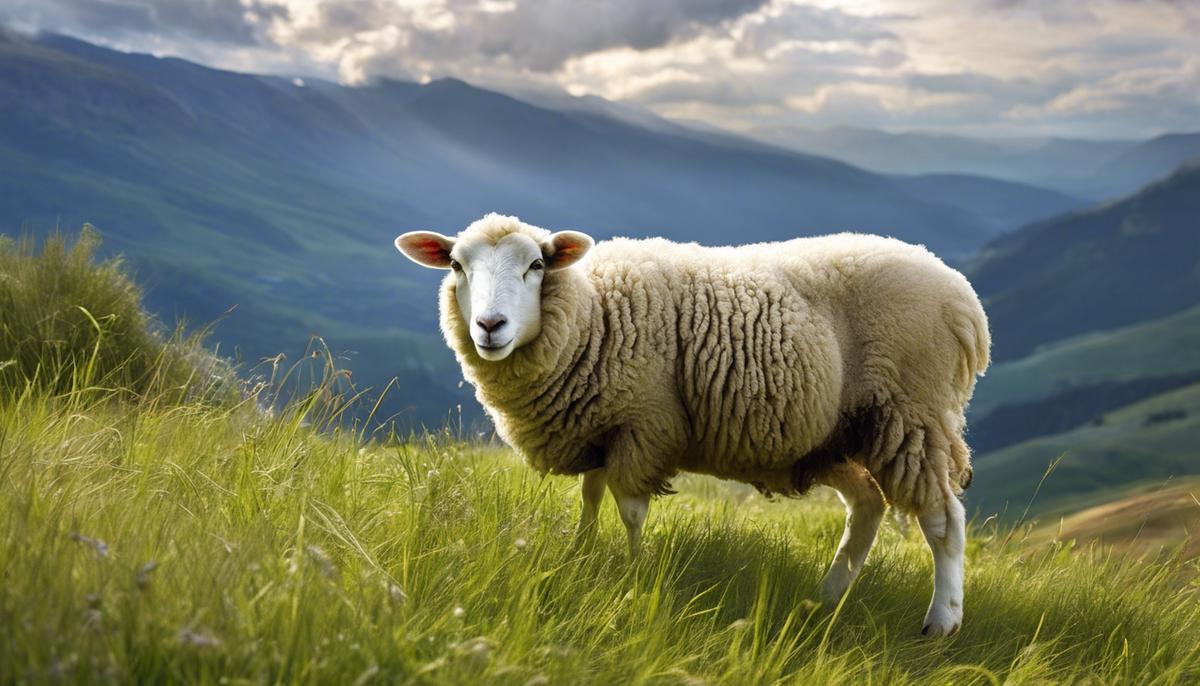
Psychological Interpretation of Sheep Dreams
Theoretical frameworks in psychology, such as cognitive, humanistic, and psychodynamic theories, to name but a few, provide robust scaffolding for unraveling dream content and symbolism. When applied to the interpretation of sheep in dreams, these paradigms illuminate the complexity and richness of our unconscious mind, waves of emotions, and subconscious ponderings.
From a cognitive psychology perspective, dreaming about sheep can be attributed to our memory consolidation. Cognitive theory posits that dreams reflect our working memory content and former experiences. In this view, if a person had dealings with sheep or if sheep featured prominently in a recent conversation or event, then sheep may manifest in the dream. Hence, dreams may serve as a ‘rehearsal’ of past experiences embedded in our cognitive functioning. Oracle narratives and symbolism associated with divinity and pastoral scenes might stem from the dreamer’s cultural, religious, or spiritual experience with the symbology, and not necessarily suggestive of latent or subconscious desires.
Following the humanistic school of thought, characteristically founded on the notion of self-actualization and personal growth, sheep might signal the need for introspection and spiritual exploration. Encompassing sheep’s attributes of innocence, humility, sacrifice, and guardianship, the dream may well be the unconscious prompting towards behaviors that line up with self-identified values or pining for meaningful interpersonal relationships. Carl Rogers, a pioneer of humanistic psychology, might interpret such a dream as a manifestation of the ‘actualizing tendency’ – an innate drive in all species to adapt, survive, and reach their full potential.
Delving into the realm of the psychodynamic theory, dreams about sheep could bear much broader connotations. Based on Sigmund Freud’s theories, the dreaming mind is a meeting ground between voluntary and involuntary thought, often revealing more than it conceals. Hence, the presence of sheep in dreams can be associated with latent, unfulfilled desires, and conflicts. For instance, the Biblical dichotomy between sheep and goats could border on the dreamer’s internal struggle between societal conformity (sheep) and rugged individuality (goats). The presence of a superior shepherd figure might point to unconscious feelings of low self-worth, or unmet needs for guidance and protection, reflecting the Freudian psyche triad – the id, ego, and superego.
A straightforward Jungian interpretation might consider the sheep as an archetype, representing a universally prevalent symbol influencing the dreamer’s thoughts and behaviors. The dream could indicate a quest for inner peace, innocence, and spiritual purification, aligning with Jung’s concept of individuation and self-search for completeness.
However, it is essential to reiterate that dream interpretations are subjective and contextual. Each theoretical framework provides a valuable lens, but none should be viewed as definitive. Dreamers, ultimately, are the best interpreters of their nocturnal narratives, as they possess the keenest understanding of their lived experiences and conscious-unconscious dynamics. The role of psychology, then, is to lend classified structure and articulate language to this ethereal world of dream interpretation, thereby assisting individuals in unearthing signals from the cosmos of their unconscious.
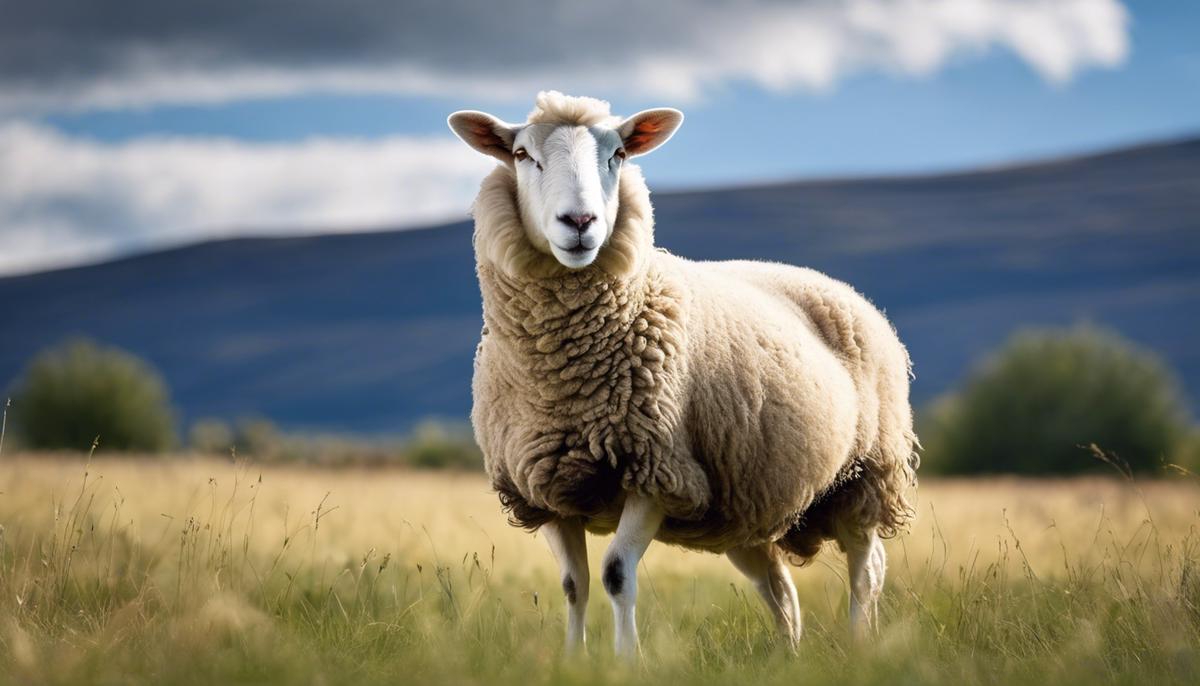
Cultural Influence on Sheep Dream Interpretation
As we delve into the realm of dream interpretation and cultural constructs, one beholds how fundamental aspects of an individual’s persona, such as cultural and religious beliefs, can greatly influence the understanding and meaning of their dreams. Here, the cognitive, humanistic, and psychodynamic theories that underpin psychological studies form the substratum for analyzing this phenomenon.
From the cognitive theory’s standpoint, dreams are viewed as reflections of working memory content and assimilations of past experiences. In this perspective, dreaming of sheep in a biblical context can manifest from previous spiritual readings or cultural exposure. If an individual grows up reading biblical narratives or is immersed in a culture deeply rooted in these traditions, his subconscious mind may involve sheep in dreams as symbolic representations of innocence, obedience, or sacrifice.
When viewed through the lens of humanistic psychology, dreams become tools for introspection and personal growth. Here, the dreamer is seen as someone who is striving towards achieving a state of self-actualization. Dreams involving sheep can serve as gentle reminders of a pursuit towards humility, compassion, tolerance, and unconditional love. They can symbolize the dreamer’s longing for inner peace or a journey towards spiritual purification.
Psychodynamic theory presents an interesting perspective, purporting dreams to be revealers of latent desires and conflicts. Sheep in dreams, thus, could be symbolic manifestations of an individual’s suppressed feelings or experiences. From a Freudian viewpoint, sheep could symbolize the appeasement or rebellion against superego’s moral constraints, or encapsulate the desire of the ego to maintain a sense of balance and harmony.
For an in-depth understanding, we turn to Carl Gustav Jung, who introduced the concept of archetypes. Sheep, in a Jungian sense, may represent the archetype of the self – an embodiment of tranquility, inner peace, and spiritual purification, derived from the longstanding cultural and biblical symbolism associated with them.
That being said, it is crucial to note that interpretation of dreams is subjective and heavily depends on the individual’s unique context, experiences, and perspective. Hence, sheep dreams can signify different meanings depending on the individual’s cultural, religious, and personal frameworks. A person’s dream about sheep clearly offers a window to their subconscious, revealing the profound influence of cultural constructs on their mental and spiritual processes. A deeper understanding of these cultural constructs and psychological theories can undoubtedly facilitate a more enriching and nuanced interpretation of such dreams, fostering personal growth and introspection.
The study of how cultural constructs influence dreams underscores the interconnectedness of our waking experiences and subconscious manifestations, reflecting the intricate tapestry of human psychology.

Practical Application of Sheep Dream Interpretation
Moving forward, it is crucial to explore the effects and potential implications that interpretations of sheep dreams can have in an individual’s everyday life. While the aforementioned symbolic, psychological, and cultural contexts of sheep dreams provide a solid basis for such an exploration, the impact they have on a person’s waking life is an equally significant area of inquiry.
Psychotherapists and dream analysts often utilize dream recall as a therapeutic tool due to the potential wisdom harnessed within. The interpretive value of dreaming about sheep as a manifestation of innocence, purity, and humility might prompt the dreamer to reassess their waking relationships and personal ethics. In this light, a sense of righteousness may awaken, alongside the rebalancing of an individual’s moral compass, to align with these symbolic associations.
Further studies propose that dreams can provide perspective on past experiences and facilitate problem-solving regarding unresolved issues. As such, dreams featuring sheep may serve as a prompt for introspection and personal growth. For instance, a lost sheep in a dream may manifest the unconscious awareness of straying away from one’s course in life or the negligent loss of a noteworthy aspect of oneself.
Additionally, given the humanistic theory emphasizes personal fulfillment and inner potential, dreams about sheep, symbolizing inner peace and spiritual purification, could act as prompts for the dreamer to pursue their path towards self-actualization. This pursuit may manifest in real-life actions aimed at personal development and cultivation of unconditional positive regard for oneself and others.
Furthermore, evolutionary psychology might propose that dreaming of sheep, in their symbolic shepherd-flock relationship, may indicate social cohesion, emphasizing the necessity of cooperation and mutual supportiveness in survival.
Furthermore, considering the Freudian interpretation, the sheep, symbolizing innocence and purity, might suggest repressed desires for tranquility and wholesomeness amid chaos and corruption. Meanwhile, the Jungian archetypes suggest dreams of sheep may elicit a deeper understanding of the collective unconscious, promoting a sense of unity, spirituality, and contentment in the dreamer’s waking life. This provision of solace can indeed foster psychological resilience.
Nevertheless, it is of utmost significance to note that the interpretation of dreams is highly subjective and greatly influenced by individual, cultural, and circumstantial contexts. Consequently, the implications of dreaming about sheep in everyday life may vary greatly based on these differences.
Ultimately, the ability of sheep dream interpretations to offer invaluable insights and prompt introspective exploration serves to provide potential pathways for self-understanding and personal growth, ultimately evidencing their prospective implications in everyday life.
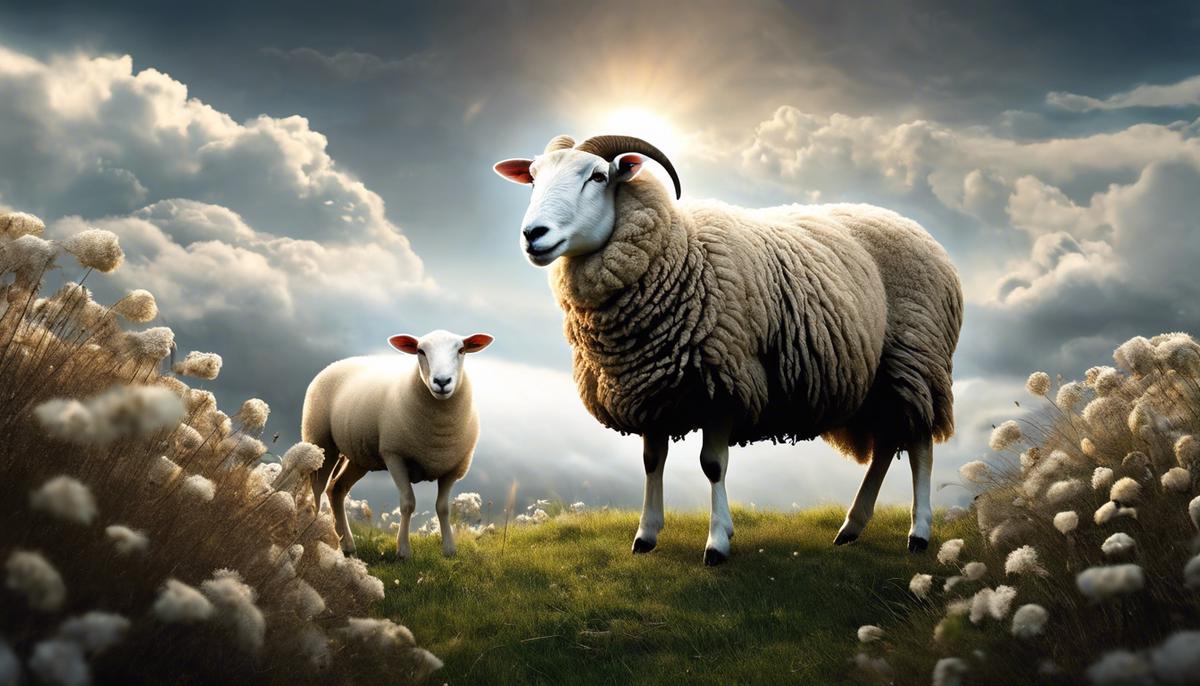
The exploration of the symbol of sheep in dreams unveils a compelling interplay between biblical representation, psychological interpretation, and cultural influence. The expanse of this analysis serves as a testament to how understanding such symbolism can serve as a tool for introspection and spiritual growth. The profound essence of sheep in dreams, apart from assisting in decision-making processes, encourages a broader perspective on the implications of our subconscious narrative. Therefore, every dream crowned with the symbol of a sheep isn’t just a fleeting scenario but an invitation to a deeper, more meaningful unraveling of self and spirit.

